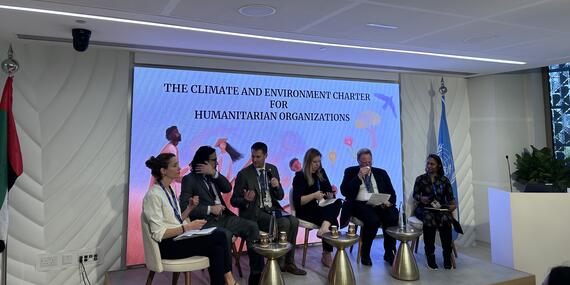Day four @the Hub

By Ghalia Bouran
We learnt that the Climate and Environment Charter for Humanitarian Organizations is being operationalized. The need for continuous communication between policy makers and affected communities to better assess what people need was underlined in another session on the fourth day at the Hub.
A Secretariat for the Climate and Environment Charter for Humanitarian Organizations: Strengthening the humanitarian response to the climate crisis: Organizer: ICVA: The Climate and Environment Charter for Humanitarian Organizations is being operationalized with the US supporting the Secretariat with US$600,000 over the next two years. As of 2021, nearly 400 organizations have signed the charter, which includes seven commitments. One of the commitments focuses on setting up a response and defining programmes to reduce future humanitarian needs through the nexus approach.
The Charter also emphasizes embracing the leadership of local communities, involving them in programme design, and acknowledging that those facing challenges often have indigenous solutions but lack resources.
The Secretariat was established to help signatories set realistic targets, as many expressed the need for support in this area. The Secretariat, a two-person team, serves as a referral centre and focuses on communication, engagement, and building capacity in communities to respond to their needs.
During a question-and-answer session, issues such as monitoring, data alignment, and the role of cash in learning partnerships were discussed. Panellists noted a need for humanitarian presence in climate conferences like COP27 and COP26.
Gender inequality of risk: Key considerations for anticipatory humanitarian action: Panellists pointed out that women are under-represented at the UN climate talks and funding for programmes to address gender imbalance was also limited. Funding generally has not been able to keep up with increasing humanitarian needs. It means that gaps between needs and resources is increasing, anticipatory humanitarian action has become secondary which is dangerous.
Women panellists called for the Loss and Damage Fund to be more sustainable in transforming situations. Calls were made for women-owned and led initiatives to empower women.
Understanding the role of community-led information in shaping responses to climate-change impacts in humanitarian settings: Panellists underlined the need to have continuous engagement with people affected by the climate crisis while planning a response. Some speakers pointed out that authorities and aid organizations can act in silos. Journalists at the meeting said that they can act as the bridge between policy makers and affected communities conveying their needs. It was conveyed that it is important to be able to transmit essential information to affected people - this is inclusive early warning and anticipatory action.
All panellists underlined several messages that two-way communication makes for adaptive decision making and accountability; and affected people should have safe access to relevant and reliable information and media should be empowered to be able to do that.
